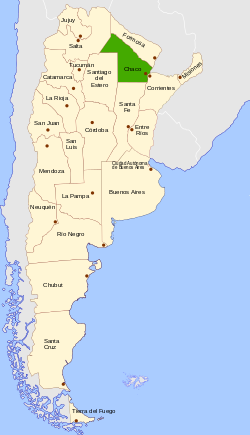Province of Chaco
| Chaco | |||
|---|---|---|---|
| Province of Argentina | |||
|
|||
 Location of Chaco within Argentina |
|||
| Country |
|
||
| Official Languages | Spanish, Kom, Moqoit and Wichí | ||
| Capital and largest city | Resistencia | ||
| Government | |||
| • Governor | Domingo Peppo (PJ) | ||
| • Deputies | 7 | ||
| • Senators | 3 | ||
| Area Ranked 12th |
|||
| • Total | 99,633 km2 (38,469 sq mi) | ||
| Population (2010) | |||
| • Total | 1,055,259 | ||
| • Rank | 10th | ||
| • Density | 11/km2 (27/sq mi) | ||
| Demonym(s) | Chacoan, chaqueño | ||
| Time zone | ART (UTC−3) | ||
| ISO 3166 code | AR-H | ||
| HDI (2016) | 0.816 Very High (24th) | ||
| Website | www |
||
The Province of Chaco (Spanish: provincia del Chaco, Spanish pronunciation: [ˈtʃako]) is a province in north-eastern Argentina.
It is bordered by Salta and Santiago del Estero to the west, Formosa to the north, Corrientes to the east, and Santa Fe to the south. It also has an international border with the Paraguayan Department of Ñeembucú. The capital, and largest city, is Resistencia.
With an area of 99,633 km2 (38,469 sq mi), and a population of 1,055,259 as of 2010, it is the twelfth most extensive, and the ninth most populated, of the twenty-three Argentine provinces.
Chaco Province has historically been among Argentina's poorest regions, and presently ranks last by per capita GDP and on the Human Development Index.
Chaco derives from chacú, the Quechua word used to name a hunting territory or the hunting technique used by the people of the Inca Empire.
Annually, large groups of up to thirty thousand hunters would enter the territory, forming columns and circling their prey.Jesuit missioner Pedro Lozano wrote in his book Chorographic Description of the Great Chaco Gualamba, published in Cordoba, Spain in 1733: "Its etymology indicates the multitude of nations that inhabit that region. When they go hunting, the Indians gather from many parts the vicuñas and guanacos; that crowd is called chacu in the Quechua language, which is common in Peru, and that Spaniards have corrupted into Chaco".
...
Wikipedia


